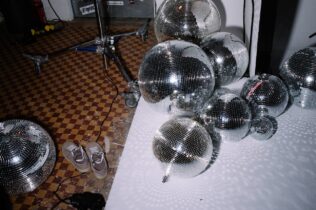
Photo by Aleksandar Pasaric.
In five weeks it will be March again.
That’s a hell of a thing, isn’t it? If you’re an Aries or later you’re coming up on your second pandemic birthday. It’s been almost a year of this.
Back in March, we were all reading about grief. Remember that article? It talked about how we were doing a strange, anticipatory grief back then. Grieving the losses we hadn’t felt yet, but could see coming. Well. They came.
We’re all figuring it out, of course. None of us is new to this any more. We have a system for groceries. Weekly zoom calls. We have found ways to endure and find the moments of joy in the midst of it all.
But in the last few weeks it’s striking how many people just. feel. flat. It’s like all the deferrals, and “soon, I hope,” and “can’t wait untils” have claimed their energy. Parked it, in some future-post-COVID place. Again, it’s not that there’s no joy – humans always find ways to create moments of joy. But a lot of them seem to be finding it harder to access, at the moment.
One foot in front of the other
We’re back in lockdown in Toronto. Though, honestly, in so many ways it feels like we never left. We’re back to waving at neighbours who are often the only in-person interaction we have all week.
“How are you?” they holler from the end of the driveway.
“OK,” we holler back. “You?”
“Holding up. It’s hard.”
We’ve been reading more history books. In particular, ones where people live through grand upheaval. Though, to be fair, this is most history books. We tell our kids that their grandkids won’t believe it. Someday it will be unimaginable.
For now, we take it one day at a time. And if that sounds cliché, it’s because it is. It is the cliché of the moment. The cliché people pull out of their pocket dictionary of clichés for times like these. It’s right next to “this too shall pass.” In the how to muscle through untenable shit section.
Back when we were in the fog, we talked about small movements. That in fog, you slow way down because you can’t see the way forward. That’s not where we are anymore. We can see more clearly. We can guess pretty well what the next few months will feel like, and even feel hopeful about the months after that. But for a lot of us, when we try to hold it all in our heads, our brains refuse. Everyone is reaching the point of overwhelm much faster than usual.
We’re hearing from more folks that they start at the top of their todo lists and read them all the way to the bottom. Only to start at the top again without getting anything done. Eventually, through sheer force of will, they pick one. A small one.
Moving one foot. And then another. And tomorrow they wake up and do it all again. One day at a time.
Maybe this is you and maybe it isn’t. But if you’re leading a team, understand that many of your people are doing this. And if so, here are some things you can do to help.
Prioritization v Inertia
For folks who are struggling to get started, there are two common culprits. Prioritization and inertia. The symptoms looks similar but the treatments are different.
If people on your team are struggling to get themselves rolling, a good place to start is to ask them. “Is this a problem of too many, or too big?” Truthfully, they will probably answer, “too many AND too big oh my god.” Fair enough. It may be that your team needs help with prioritization and inertia these days. But most bosses we work with find that it helps to have a system for thinking it through.
When prioritization is the issue, I stare at the to do list. I don’t know where to start because everything seems important. I need a clearer idea of what matters most, how it connects to what the organization as a whole is trying to get done. And I may need permission for some thing(s) to drop in service of that higher priority stuff.
To help, I need a boss to say, “if you can only do one thing, make it this.”
When inertia is the issue, I can’t get started because I am at a standstill. Objects at rest stay at rest. And I can’t access the energy to start myself up again. The instinct to make the work smaller and then smaller again? It doesn’t do a damn thing to solve for prioritization. But it reduces the amount of energy I need to get rolling. And once I am moving, it’s easier to keep going.
To help, bosses can break the work into smaller pieces. Bosses are well positioned here. We often came up through the work our teams are now doing. And even if you didn’t, you can still be a sounding board. Ask your people how they might break down complex tasks into discrete steps. One foot in front of the other. One day at a time.
We all need things to look forward to
Another benefit of chunking work into smaller bits is that you have more moments to celebrate. And, right now, we could all use some tiny wins.
We don’t need bosses to pretend a small win is a huge win. Do not coddle, or patronize, your teams. They will see through it, we promise. But as we enter year two of a global pandemic, even our small wins are remarkable. And they are worthy of celebration. Even if the celebration is commensurate with the size of the win.
We also desperately need things to look forward to. And the obvious pick – the idea of things going back to normal – is too big to hold in our heads. It’s an avatar for our grief. For everything we’ve deferred. And it amplifies every restriction that is still in place. There is a light at the end of this long, dark tunnel. But it is still many small steps away and their enumeration is what feels so overwhelming.
So yes, look forward to a vaccine, or herd immunity, or hugging your people. But we are growing impatient. We need shorter timelines. We need to look forward to things and then for those things to happen.
In our house, this past week, it was french fries. Really good french fries, from a place that got take out right. We swear those french fries made us want to cry. It’d been almost a year since we’d had proper fries. Your version doesn’t have to be twice fried potatoes. But it can be that small or silly or frivolous. And it doesn’t have to make sense to anyone but you. But you absolutely need good, reachable things to look forward to. Because hope has its own inertia. When you feel like you’re stuck, you need something to kickstart it again. Go small. To get going.
One foot. Then the other. We got this.
– Melissa and Johnathan






